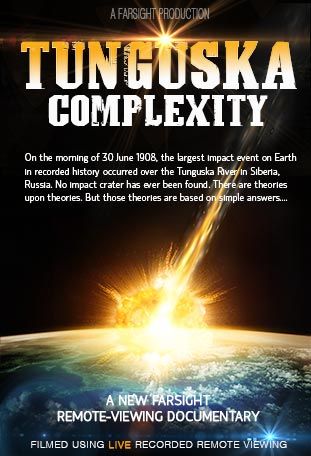Tunguska Complexity!
MAIN TRAILER
You can also see all the pre-release trailers for the project here.
 On the morning of June 30th, 1908, an explosion occurred in Siberia, Russia. It happened near the Stony Tunguska River in a sparsely populated area known as Eastern Siberian Taiga. Approximately 800 sq. miles, or more than 2,000 sq. kilometers were flattened.
On the morning of June 30th, 1908, an explosion occurred in Siberia, Russia. It happened near the Stony Tunguska River in a sparsely populated area known as Eastern Siberian Taiga. Approximately 800 sq. miles, or more than 2,000 sq. kilometers were flattened. It is hard to overstate the magnitude of the explosion. 30 million trees were flattened, and there was an area of approximately 200 sq. kilometers where the vegetation was burned. There have been many estimates of the force of the explosion, and they range from 10 to 90 Megatons. 15 megatons is about 1,000 greater than the nuclear explosion that destroyed Hiroshima at the end of World War II.
There were approximately 700 witnesses, and they report seeing at least one object flying horizontally across the sky. Some evidence suggests there were two intersecting objects coming from different directions. There was a huge shock wave producing an impact on the ground that was similar to a 5.0 magnitude earthquake, using the standard Richter scale. Some of the witnesses, albeit distant from the explosion, were knocked off their feet by the shock wave as it traveled outward.
Now, for the first time ever, new data shed light on what really happened over Siberia when that explosion shook the world. These new data are controversial, even among those who work at Farsight.
Was this simply a meteor? Was it an act of an extraterrestrial group? Was it a combination of both? See the documentary, and then you decide. The Tunguska event is one of the most singularly important events to happen on this planet in hundreds, and perhaps thousands of years. Whatever caused it was complex. Really complex.
Mainstream science is in disarray with respect to the Tunguska event. Watch this video, and you will see why.
The Farsight Institute is the leading venue for large public projects involving remote viewing as it is done using methodologies that are derived from those developed and used by the U.S. military for espionage purposes. But Farsight is civilian, and now we focus those methodologies on targets that reveal what has been hidden from so many for so long.
Tunguska Complexity. This documentary tells the story of the most important violent event in modern times.
The Remote-Viewing Data
Blind Conditions for All Remote-Viewing Data: All remote viewing for this project (as with all projects conducted at The Farsight Institute) was conducted under totally blind conditions. The viewers were told nothing about the project or specific targets while they were conducting their remote-viewing sessions. They were only instructed that there is a target, and that they should remote view it.
A Note About the Quality of the Remote Viewing for This Project: Dick Allgire, Daz Smith, and Aziz Brown have well-documented public track records with remote viewing, a great deal of which is available to see on the web site for The Farsight Institute in diverse projects, some of which span many years. The quality of the remote-viewing sessions for this project is absolutely stellar. These remote-viewing sessions are clear representations of the targets, both verbally and with unambiguous drawings.
The Remote-Viewing Target for This Project:
Target #17: The viewer will remote view the event known as the "Tunguska Event" that occurred on the morning of 30 June 1908. This event involved a large explosion over Eastern Siberian Taiga, near the Stony Tunguska River, in Yeniseysk Governorate (now Krasnoyarsk Krai). This event resulted in the flattening of forest over more than 2,000 sq. km, or 800 sq. miles. The viewer will perceive the explosion itself, as well and the cause of the explosion. The viewer will also perceive other elements that attract the attention of the remote viewer that directly relate to the explosion and its cause.
Note: The above target description was given to the remote viewers only AFTER the remote viewers had completed and delivered all remote viewing (paper sessions and video) for this project.